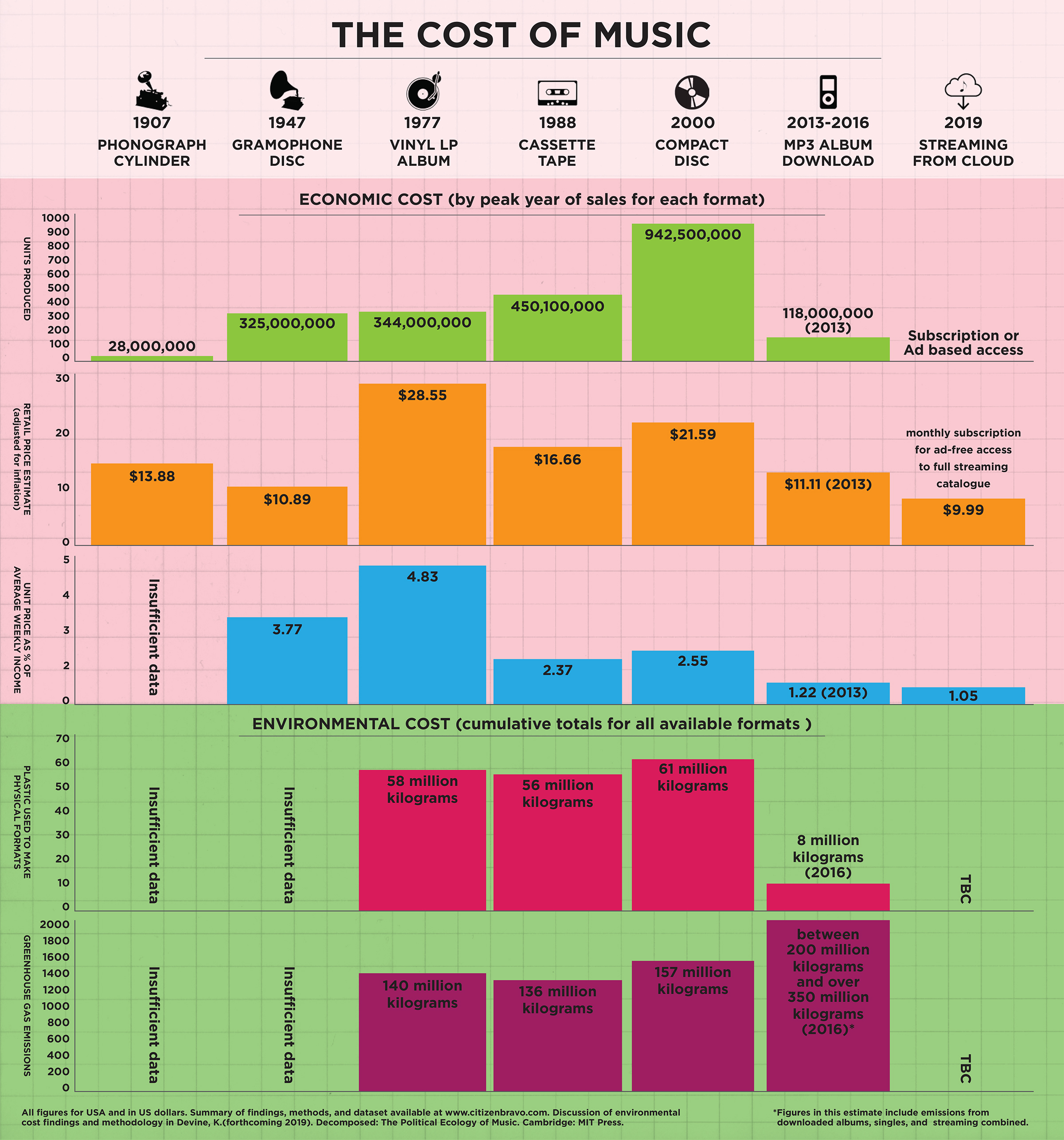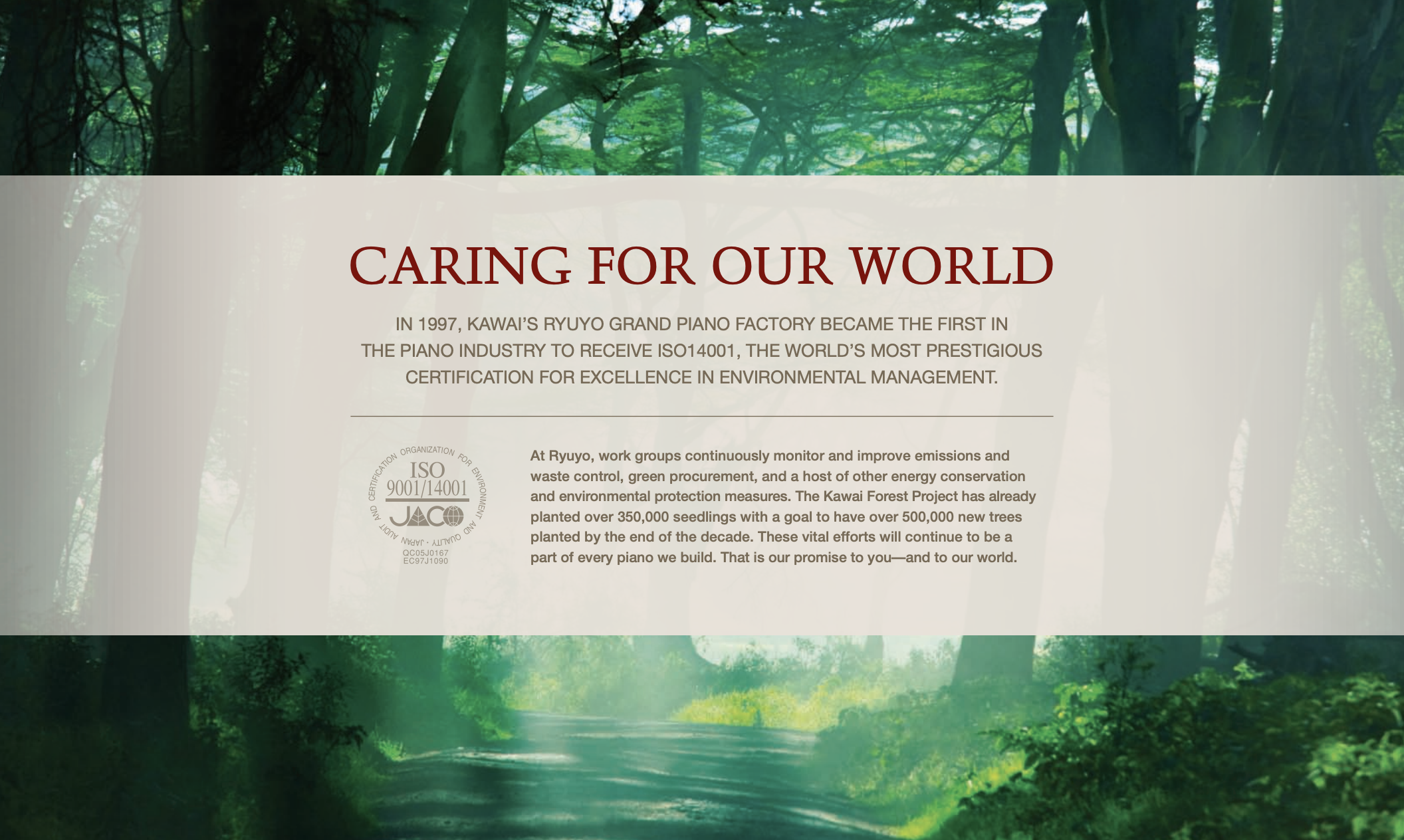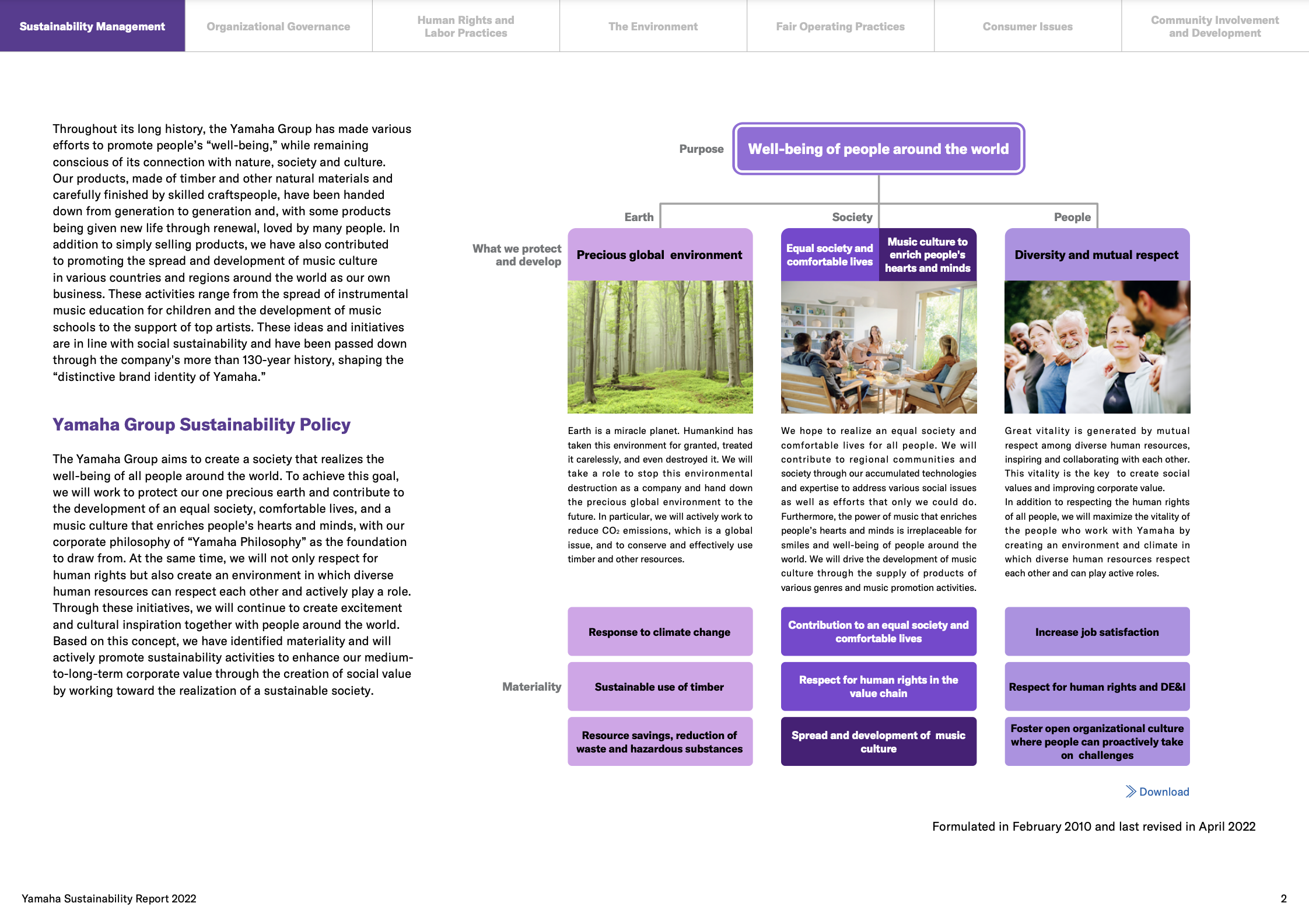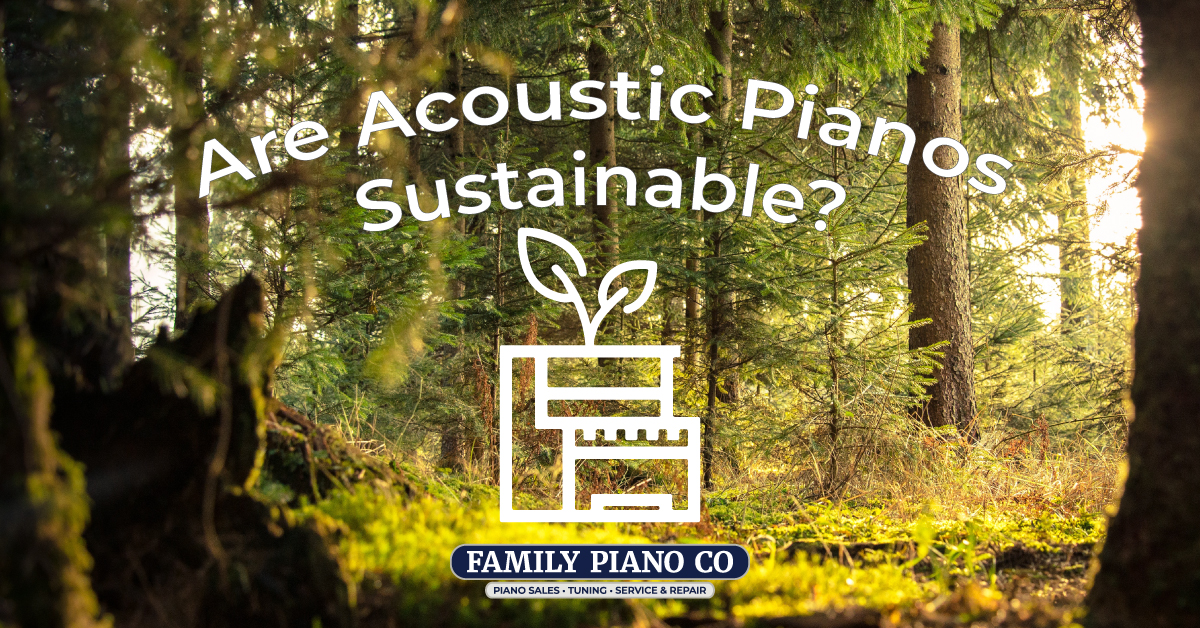We love our planet!
We’re really weary of greenwashing — otherwise known as lying — so we’re admittedly quiet in going about our own pro-sustainability efforts. But we have been making strides!
In the past few years, we’ve been:
- Digitizing our paperwork to cut down on waste.
- Reducing the amount of plastic we use in-store and when fulfilling orders.
- Turning off digital pianos and other energy sources when they’re not in use.
- Repurposing cardboard when possible instead of resorting straight to recycling.
We know this isn’t enough. But we hope to continue these efforts — and figure out other ways to reduce our impact too.
The thing is: it’s hard!
Frankly, the world is built on fossil fuels. And just by turning on lights and driving to work, we’re supporting the fossil fuel industry. We ourselves don’t even have the power to demand our pianos arrive in biodiesel trucks (yet).
For Earth Day this year, we thought it’d be neat to consider the eco-friendliness of acoustic pianos and music at large. It’s a bit of a strange question, but it’s one that we’re interested in nonetheless: are pianos sustainable?
We intend this as a starting point for the sake of consideration. We’ve edited this article for accuracy, but there’s bound to be things we overlooked. As such, we’re linking to all our sources so you can fact-check us — and keep doing your own research!
Environmentalism in Music Industry
For some context, it’s worth looking at the environmental impact of the music industry.
Music is often seen as an immaterial medium, but that isn’t exactly true. While we don’t need to buy cassettes or CDs anymore, downloading music does come with a fair share of carbon emissions.

Source: Rolling Stone's article, "Is Streaming Music Dangerous to the Environment? One Researcher Is Sounding the Alarm."
“The research shows GHGs [greenhouse gases] of 140 million kilograms in 1977, 136 million kilograms in 1988, and 157 million in 2000. But by 2016 the generation of GHGs by storing and transmitting digital files for those listening to music online is estimated to be between 200 million kilograms and over 350 million kilograms in the US alone.” —University of Glasgow, 2019
Huge live music productions are also ghastly for for the environment. Artists travel all over the world, festivals tend to source non-local food, and the whole stage needs to be powered.
Plus, there tends to a ton of garbage on the floor by the end. That’s disappointing enough, and it’s made worse when you consider it’s only a fraction of the total waste produced.
Our favorite article on this matter is EDM.com’s “How Music Festivals Are Destroying the Earth.” They cite statistics and go much further in-depth than we have here.
There are signs of hope though. Artists and fans have been fighting for climate change in more recent years. And there are more and more organizations and production companies dedicating themselves to the cause too.

You can check out Reverb.org for starters. There's a whole lot more attention being dedicated to environmentalism in music these days ie. TheFace, Green is the New Black, CleanScene.
But what about instruments and pianos specifically? Streaming and live music are seemingly starting to get greener, but what about freight and manufacturing?
These topics are a bit more complicated. Especially freight and transportation infrastructure which is a whole other beast. (Additional Reading: Freight Transportation Energy Use & Environmental Impacts)
For now, let’s try to break down one key component of the manufacturing process that pertains to acoustic pianos: wood.
Sourcing Wood for Piano Manufacturing
Wood is the primary material used in piano construction, and the sourcing of that wood can have a significant impact on the environment. Therefore, this is an area that we think should be paid the most attention to.
After all, deforestation is a major environmental issue! Cutting down old-growth forests can have a devastating impact on the ecosystem including soil erosion, loss of biodiversity, and increased emissions. Plus, unsustainable logging can lead to the destruction of sensitive habitats and ecosystems, including the habitats of endangered species.
The ethics of how the wood is farmed is also an important consideration. Some logging operations may engage in practices that harm workers or communities ie. the use of child labor, unsafe working conditions, and the displacement of indigenous peoples.
So sure, companies like to brag about how high-quality their wood is. But was that spruce soundboard made sustainably and ethically too?
It seems like the answer is basically yes. Most notably, Steinway, Kawai and Yamaha all source wood from sustainably managed forests and implement programs to ensure their suppliers adhere to ethical labor practices. It’s not surprising that they approach sourcing such an important part of their pianos with some care!
Steinway & Sons sources Birch, Hard Maple, and Yellow Poplar from trusted FSC-Certified lumber suppliers (Forest Stewardship Council). —Steinway’s Sustainability Page
But we do think it’s important to keep paying close attention to these efforts. While a yearly CSR report and the Kawai Forest Initiative is great, we want to keep holding companies to even higher standards. They should all continue to acquire third-party certifications (Steinway uses FSC-certified wood, Kawai became the first piano company with ISO 14001 certification in 1997, etc.), and become even more transparent about their green strides!
On the topic of materials, it’s of course also notable that older unethical practices have gone away. Ivory keys are illegal now, and people even today are still continuing to figure out how to recreate ivory’s properties artificially!
Environmentally Friendly Piano Companies?
Wood sourcing is only one piece of the pie when it comes to sustainable piano manufacturing though. For starters, there’s also the other materials to note, the labor behind its construction, and the entire logistics process!
As covered, some of the bigger names in the industry have made commitments to reduce their carbon footprint and better promote sustainability.

"The Kawai Forest Project has already planted over 350,000 seedlings with a goal to have over 500,000 new trees planted by the end of the decade. These vital efforts will continue to be a part of every piano we build. That is our promise to you—and to our world."

This is the first page of Yamaha's 2022 Sustainability Report. Kawai's 2022 Report on Sustainability, Environment and Social Governance is also available! This is the kind of transparency we need!
“The Steinway Factory in Astoria, NY features one of the world’s largest solar thermal powered temperature control systems of its kind. . . . Working together with energy consultants since 2006, Steinway has reduced its Astoria Factory energy consumption by 35%.” —Steinway’s Sustainability Page
Again, we’d like to see more third-party certifications for these efforts. And more reports with how improvements are coming along. But we can be happy that three of the bigger manufacturers are beginning to have these conversations more openly.
Certainly there’s always room for improvement. And as technology develops further, perhaps we can even get those biodiesel trucks and faster shipments by sea, without too much of the cost being passed onto consumers. . . .
In the meantime, we ourselves should prioritize sustainability and ethics when making purchasing decisions. While individual actions will never replace wide changes brought on by legislature and corporate regulation — we do think any positive impact is worth celebrating, no matter how small.
Buying a Sustainable Piano is Possible!
toAt the end of the day, pianos last a long time. So assuming a lifetime of 80+ years for any given piano, the daily carbon emissions and overall impact are going to be relatively low.
To go even greener, you can buy a piano locally. Avoiding transport as much as possible minimizes carbon emissions some. Buying a used piano is also a good way to reduce waste. New pianos are becoming greener, but if you can stop a piano from going to a landfill, that’s a wonderful thing too.
Of course, what’s most relevant isn’t necessarily buying the piano, it’s keeping it! It’s essential to take care of your piano properly, which includes regular tuning and service, to ensure it lasts for years to come. Valuing your possessions and avoiding overconsumption is crucial in reducing our impact on the planet!
Finally, it’s worth highlighting that piano companies don’t follow the yearly iteration model popularized by electronics companies like Apple, which is also a plus. Obviously no one would trade up their acoustic piano each year — that’d be a hassle — but this is also true for digital pianos.
As much as even we ourselves complain about older actions in digital pianos, it is a better model for the environment. It’s also worth remembering that digital piano actions and tech are at a very respectable point now. Better isn’t always best, and the price we pay for something goes beyond the number on a price tag!
Overall, we think we can all feel pretty good about the greenness of pianos. Piano manufacturing, and the music industry at large, is beginning to shed more light on the topic. We should keep companies accountable, sure, but we are generally optimistic that global effort towards sustainability will continue!




0 Comments